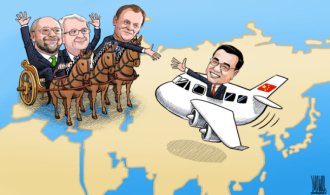Confidence holds against claims of speculators who try to create panic
(China Daily) Updated: 2016-01-28 08:09
 |
|
Chinese Vice President Li Yuanchao was giving a special address injecting confidence into global leaders of politics and businesses at the annual meeting of World Economic Forum in Davos, Switzerland on Thursday. [Photo by Fu Jing/China Daily] |
GEORGE SOROS, who claimed he was seeing a hard landing for China at the World Economic Forum in Davos, Switzerland, last Thursday, had made the same prediction several times in the past. Doomsayers about China are intentionally trying to create panic to snap up profits as much as possible, Xinhua News Agency commented on Wednesday:
Far from some speculators' claims, China is not a source of trouble but an important engine of global economic growth with its growing demand and investment.
The world economy is having trouble because of the sluggish growth and slow recovery of many economies. The monetary policies of the US Federal Reserve and the expansion of government debt are the original sources of the problems.
Meanwhile, China's economic transformation is currently under way. Figures show that foreign investment in China's service sector saw robust growth in 2016.
Thanks to government policies encouraging innovation and the streamlining of procedures, entrepreneurship is flourishing and bringing fundamental change to Chinese society. In the first half of 2015, the number of newly registered businesses exceeded 10,000 on a daily basis.
Job creation is also strong, which, coupled with a sound growth rate and strong capital formation and innovation, means that the world's second-largest economy is unlikely to experience a hard landing.
So why do speculators make claims that run counter to reality?
Analysts say it is because either the short-sellers haven't done their homework or that they are intentionally trying to create panic to snap up profits as much as possible.
It is true that the growth of the world's second largest economy is experiencing a relative slowdown compared with the blistering growth of the past decade. But as we know, decision-makers have now opted for a slower pace in order to make the country's growth more sustainable in the future.
Moreover, a growth rate of 6.9 percent is the envy of most other economies. China's added economic output last year was more than the GDP of Sweden or Argentina.
And Chinese tourists spent 1.2 trillion yuan ($182 billion) overseas, while the country's investors pumped 735 billion yuan into other economies.











